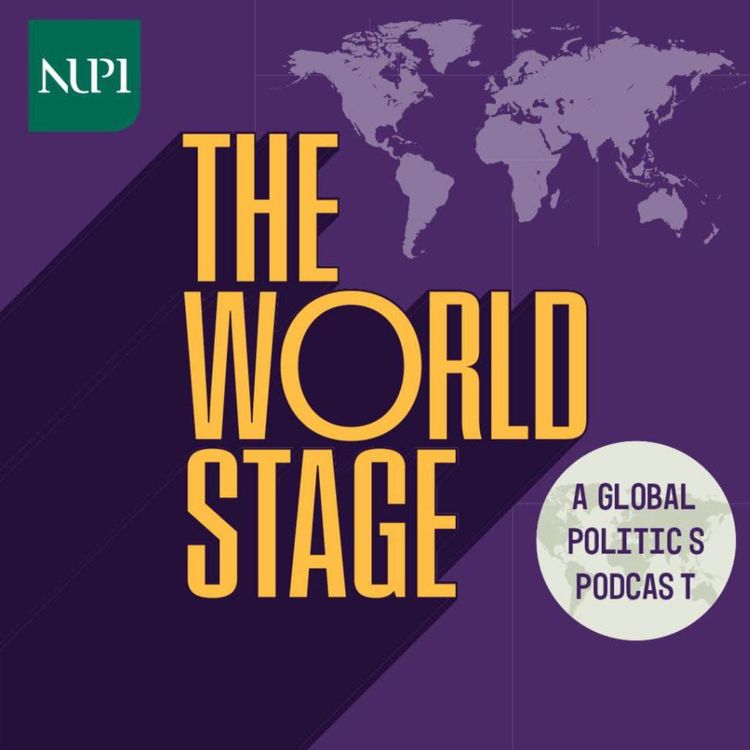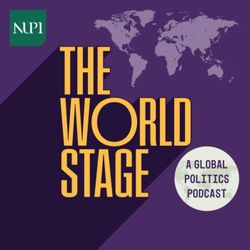Share

The World Stage
The state of European democracy
Season 2024, Ep. 8
•
In this episode of the NUPI podcast The World Stage, we take a closer look at the state of European democracy in the wake of the recent election to the European Parliament.
What will be the outcome of the right wing wave and what does it mean for the state of democracy in the EU?
NUPI Research Professor Pernille Rieker is joined by Guri Rosén, Associate Professor at the department of political science at Univeristy of Oslo, and Christophe Hillion, Research professor at NUPI as well as Professor of European Law at the University of Oslo.
More episodes
View all episodes

1. Trust, anger and the limits of EU democracy promotion
36:49||Season 2026, Ep. 1In the EU’s enlargement debate, attention usually centres on Brussels—legal benchmarks, progress reports and diplomatic bargaining. But in countries hoping to join the bloc, politics is often decided via informal power networks, fragile institutions and the everyday effort of navigating uncertainty. In this episode we shift from the top-down to the ground level as Jessica Hendrick speaks with Morten Bøås, research professor at the Norwegian Institute of International Affairs (NUPI), who is leading RE-ENGAGE’s comparative fieldwork across Albania, Bosnia and Herzegovina, Georgia, Moldova, Serbia and Ukraine. Together, they take listeners behind the scenes of how the project gathers original data in places shaped by war, protest and political pressure. Methods range from training local university students to conduct trust surveys to vignette experiments that test how citizens respond to crises and competing external “relief packages” from China, the EU, Russia and Turkey. What do early findings reveal? What does “trust” really look like in a hybrid regime? How can the EU design programmes that people actually feel, rather than reforms they never see? And what should Brussels learn about democracy promotion to avoid repeating past mistakes? This is the third episode from the RE-ENGAGE podcast series The Neighbourhood, which unpacks how countries hoping to join the EU navigate political change and outside pressure, and what that means for Europe’s democracy and security. The podcast series is produced by ECFR, and co-published by ECFR and NUPI. The RE-ENGAGE project is led by NUPI, and is funded by the European Union's Horizon Europe research and innovation programme under grant agreement No 101132314.
8. The Neighbourhood: The EU’s enlargement reality check
37:56||Season 2025, Ep. 8How are enlargement reforms unfolding on the ground and what drives progress or stagnation? The 2025 Enlargement Package presents a mixed picture: Ukraine and Moldova are racing ahead, while Serbia and Georgia are lagging. The EU itself is struggling with internal divisions and reform fatigue.This episode of The World Stage is part of The Neighbourhood series from the NUPI-led project Re-engage, produced by ECFR and co-published by ECFR and NUPI. In this episode, ECFR's Jessica Hendrick is joined by Tiago Antunes, senior policy fellow with ECFR’s European Power programme, Leo Litra, visiting fellow at ECFR and senior fellow at Kyiv’s New Europe Center and Engjellushe Morina, senior policy fellow with ECFR’s European Security programme. Together, they discuss what this year’s enlargement report says about political will, institutional resilience and the everyday impact of enlargement.How can the EU make conditionality more credible? Are EU reforms changing behaviour in governments, institutions and people’s lives? And how can Brussels keep the reform energy alive?This episode was recorded on November 12th 2025. iIt's the second episode from the RE-ENGAGE podcast series The Neighbourhood, which unpacks how countries hoping to join the EU navigate political change and outside pressure, and what that means for Europe’s democracy and security. The podcast series is produced by ECFR, and co-published by ECFR and NUPI. The RE-ENGAGE project is led by NUPI, and is funded by the European Union's Horizon Europe research and innovation programme under grant agreement No 101132314.
7. Democratic backsliding, illiberal regimes and international cooperation under pressure
35:42||Season 2025, Ep. 7The international system faces its gravest crisis in decades. As global democracy retreats, authoritarian regimes actively challenge established international rules and norms.This episode asks: Which institutions are worth saving in this "burning house" of cooperation? We analyse the paralysis of the UN Security Council and NATO's struggle against illiberal pressures as the world order begins to fragment. You will hear from Roland Paris, Alexandra Gheciu (both University of Ottawa) and NUPI's Ole Jacob Sending. The host for this episode is Marie Furhovden (NUPI).This episode is part of the NUPI led project NAVIGATOR that is investigating how the EU should navigate multilateral cooperation. The project receives funding from the European Union’s Horizon Europe research and innovation programme under the Grant agreement ID: 101094394.
6. The Neighbourhood: Europe’s enlargement moment
25:16||Season 2025, Ep. 6EU enlargement is back at the top of the EU’s political agenda as Russia’s war against Ukraine has transformed it from a bureaucratic process into a matter of European security.In this episode, Mark Leonard speaks with Lykke Friis, co-chair of ECFR’s council, director of the Danish think-tank Europa, and former Danish minister, as European leaders gather for the European Political Community summit in Copenhagen. Together they discuss why Denmark has shifted to advocating for enlargement and why Europe’s future security may depend on bringing Ukraine and Moldova closer.Is the EU ready for a new wave of member countries? Can enlargement be both geopolitical and merit-based? And what role will Denmark play in defining the EU’s next chapter?Bookshelf:Strength in members: How to rally EU enlargement for defence by Gustav Gressel, Nicu PopescuNew report on EU enlargement and integration by Piotr Buras with Lykke Friis, Engjellushe Morina and Iben SchackeDeutschland 1946: Das Wunder beginnt by Rüdiger Barth, Hauke FriederichsIndignity: A Life Reimagined by Lea YpiThis episode was recorded on October 2nd, 2025. The episode marks the launch of ECFR’s new RE-ENGAGE podcast series: The Neighbourhood, which will unpack how countries hoping to join the EU navigate political change and outside pressure, and what that means for Europe’s democracy and security. The podcast series is produced by ECFR, and co-published by ECFR and NUPI. The RE-ENGAGE project is les by NUPI, and is funded by the European Union's Horizon Europe research and innovation programme under grant agreement No 101132314.
5. Constructivist theorizing in tumultuous times (ft Nicholas Onuf and Stefano Guzzini)
30:37||Season 2025, Ep. 5With the growing sense of perpetual and compounding global crises and war, it is not only policy makers that are scrambling to respond. The discipline of International Relations has also been thrown into upheaval and reconsidering and revising its theoretical apparatus. This episode of the World Stage takes a step back and discusses the role of constructivism for Illuminating the current moment with two of its leading theoreticians: Stefano Guzzini and Nicholas Onuf.
4. Arctic ambitions: Norway’s new High North strategy
33:20||Season 2025, Ep. 4How does the new Norwegian High North strategy situate Norway and its northernmost countries in Arctic and global politics? What are the new priorities and signals in the strategy? And how will they be realized in practice in Norwegian foreign policy?In this episode of the NUPI podcast The World Stage, NUPI researcher Elana Wilson Rowe sits down with State Secretary (MFA) Maria Varteressian, and NUPI colleague Karsten Friis to discuss the new High North strategy.
3. Is the era of cooperation coming to an end?
29:23||Season 2025, Ep. 3International cooperation and the rules-based order as we know it is now at stake. The inauguration of Donald Trump in his second presidential term, Russia’s brutal war on Ukraine, and great power rivalry are just some of the factors that have had an influence on how countries can work together. In addition, several multilateral organisations are being criticised for a lack of efficiency in solving issues.In the midst of this, the EU and other institutions are working to maintain international cooperation on one hand and adjusting to the new reality on the other. In a time where uncertainty reigns, we must ask ourselves: Is the era of cooperation coming to an end?In this episode we look at the state of international cooperation both between countries and in different institutions and organisations. We also visit Johannesburg to investigate what international cooperation looks like from a South African point of view.Contributors to this episode are Amina Dossa and Buhle Kokela (students at WITS University), Sithembile Mbete (Executive Director, PARI), Malte Brosig (Professor, WITS University) and John Karlsrud (Research Professor, NUPI). Host for this episode is Marie Furhovden (NUPI). The podcast episode is part of the NAVIGATOR project, funded by the European Union’s Horizon Europe research and innovation programme under the Call HORIZON-CL2-2021-DEMOCRACY-01 – Grant agreement n°101061621. Visit the project webpage to learn more at www.eunav.eu
2. Ukraine’s secret weapon: Civil society at war
34:57||Season 2025, Ep. 2Come Back Alive and other volunteer organisations is an underappreciated, but important factor in Ukraine's fight against Russia. They are a vital part of Ukraine’s resilience as the war enters its fourth year. Come Back Alive enjoys high trust, legitimacy and cooperates closely with the brigades in the field and the Ukrainian Ministry of Defense.Volunteer organisations show how popular mobilisation works in practice when the whole society wants to contribute to the war effort. As such, they also have important lessons for the Norwegian total defence concept. In this podcast episode we explore the role Come Back Alive and similar organisations are playing, how Norway and other states can increase their support, and what lessons they can hold for the Norwegian total defence concept. In the studio are Kate Leschyshyn from Come Back Alive, and NUPI researchers Øyvind Svendsen and John Karlsrud.
1. Transatlantic security in turbulent times
33:18||Season 2025, Ep. 1The American security guarantee to Europe appears to be less iron clad than it used to be. The Trump administration seeks to shift military assets from Europe to the Asia-Pacific and expect Europe to spend 5% of its GDP on defence. How dramatic are these changes? How will it happen? And will it make Europe more exposed and vulnerable to potential Russian aggression? In this episode Karsten Friis discusses these and other relevant questions, including the newly published British Strategic Defence Review, with Max Bergmann from CSIS and Neil Melvin from RUSI.